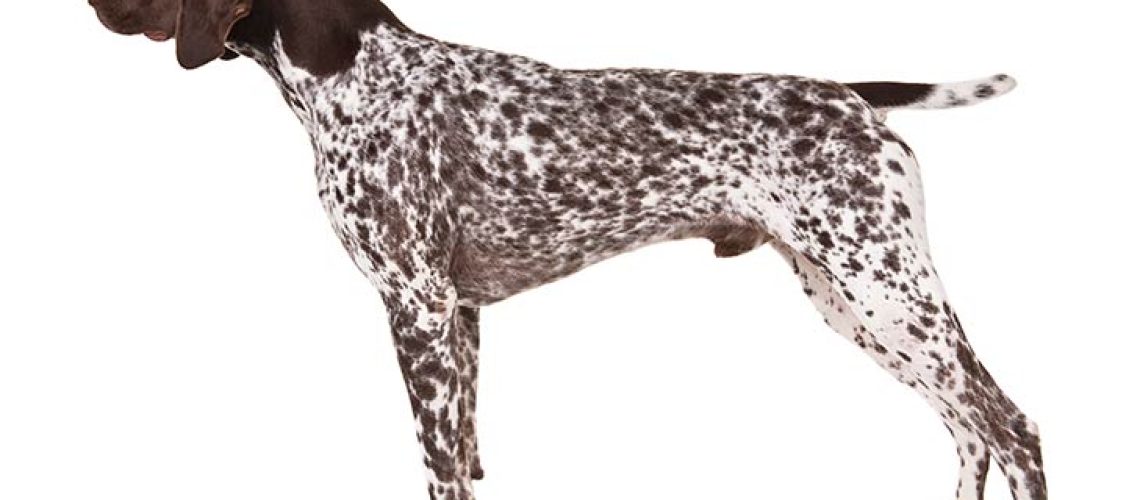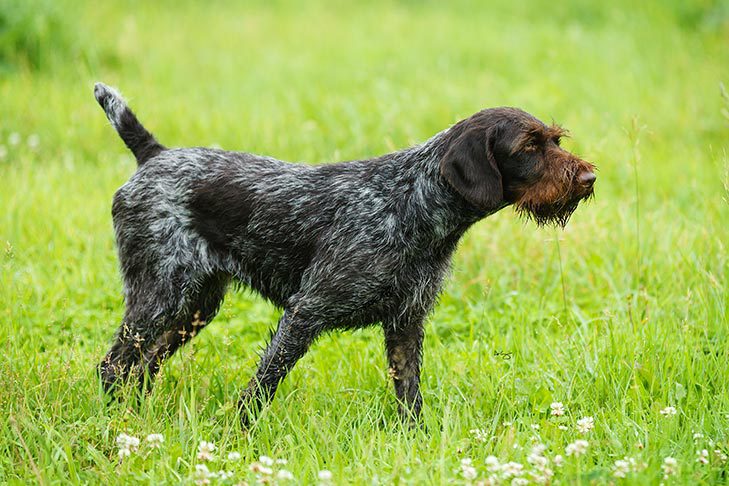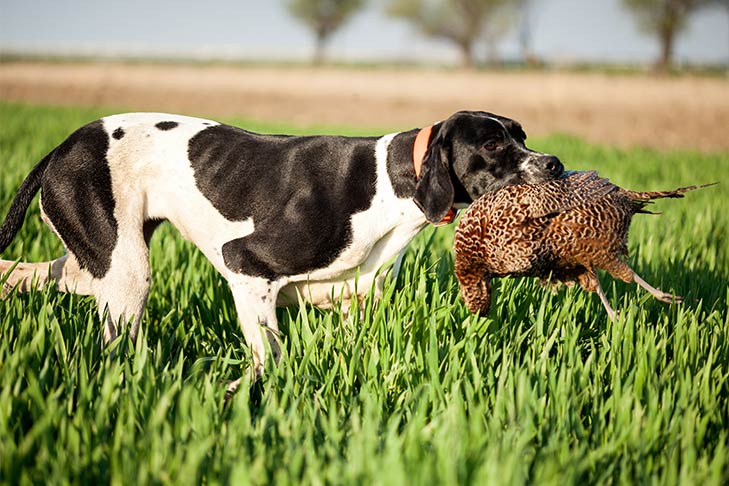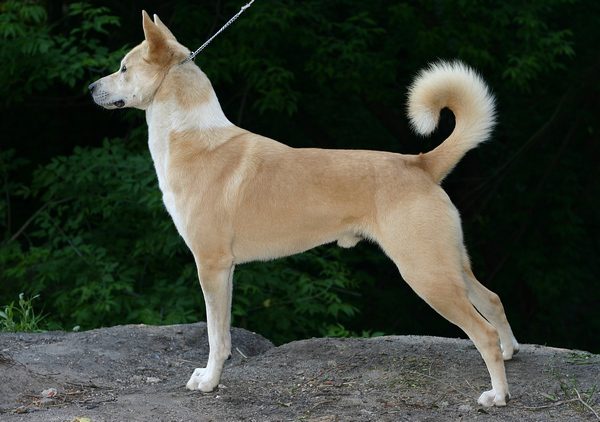Key Takeaways:
- German Shorthaired Pointers are highly energetic dogs that require ample exercise and mental stimulation to prevent boredom and destructive behavior.
- They are intelligent and versatile hunting dogs known for their ability to point, track, retrieve, and even swim.
- GSPs have a friendly and affectionate temperament, making them great family pets. However, they may be reserved with strangers and require early socialization to ensure proper behavior around new people and animals.
- Regular grooming is necessary for maintaining the GSP's short coat. Weekly brushing helps remove loose hair and prevent matting. Additionally, their ears should be checked regularly to avoid infections.
- Training should start early with positive reinforcement methods as GSPs can be independent thinkers. Consistency, patience, and firmness are key in training this breed.
Are you ready to embark on a journey into the world of German Shorthaired Pointers (GSP)? These incredible dogs are not only beloved companions but also possess a unique set of characteristics that set them apart from other breeds. By delving into the subject of GSPs, you will gain valuable insights into their care and understand why they make such exceptional pets. Whether you're a dog enthusiast or considering adding a GSP to your family, this exploration will provide you with all the information you need. So, let's dive in and uncover the wonders of the German Shorthaired Pointer breed!
Key Characteristics of German Shorthaired Pointers
German Shorthaired Pointers are a breed of hunting dogs known for their athleticism, intelligence, and versatility. They have a sleek and muscular body with short hair that comes in various colors like liver, black, or a combination of both. These dogs have webbed feet that help them swim efficiently, making them excellent water retrievers.
One key characteristic of German Shorthaired Pointers is their high energy level. They are active dogs that require regular exercise to keep them mentally and physically stimulated. This breed thrives on activities like running, hiking, and playing fetch. They also make great companions for outdoor enthusiasts who enjoy being active.
Another important trait of German Shorthaired Pointers is their friendly and sociable nature. They are known to be affectionate towards their families and get along well with children when properly socialized. However, they can be wary of strangers at first but usually warm up to them once they feel comfortable.
German Shorthaired Pointers and Their Behavior with Children and Other Pets
German Shorthaired Pointers generally have a good temperament around children when raised in a loving environment. They are known to be patient and gentle with kids, making them suitable family pets. However, it is crucial to teach children how to interact with dogs respectfully to avoid any potential issues.
When it comes to other pets, German Shorthaired Pointers can coexist peacefully if introduced properly from an early age. They have a natural hunting instinct, so it's important to supervise interactions between your Pointer and smaller animals like cats or rabbits. With proper training and socialization, they can learn to live harmoniously with other pets in the household.
It's worth mentioning that every dog has its own unique personality, so individual temperaments may vary within the breed. Early socialization and consistent training play significant roles in shaping a German Shorthaired Pointer's behavior towards children and other pets.
Exercise Needs for a Healthy German Shorthaired Pointer
German Shorthaired Pointers are an active breed that requires regular exercise to maintain their physical and mental well-being. They have a lot of energy to burn, and without proper outlets, they may become bored or develop destructive behaviors.
To keep your German Shorthaired Pointer happy and healthy, you should aim for at least an hour of exercise each day. This can include activities like brisk walks, jogging, playing fetch, or engaging in dog sports such as agility or obedience training. These dogs also enjoy swimming, which provides great low-impact exercise for their joints.
In addition to physical exercise, mental stimulation is equally important for this intelligent breed. Puzzle toys, obedience training sessions, and interactive games can help keep their minds sharp and prevent boredom. Providing them with tasks or challenges to solve will also help prevent behavioral issues that may arise from lack of mental stimulation.
Remember that every dog is different, so it's essential to tailor the exercise routine to your individual dog's needs. Consulting with a veterinarian or professional dog trainer can help you determine the appropriate amount and type of exercise for your German Shorthaired Pointer.
Grooming and Special Care for German Shorthaired Pointers
German Shorthaired Pointers have short hair that is relatively low maintenance compared to breeds with longer coats. However, regular grooming is still necessary to keep their coat healthy and free from debris.
Brushing your German Shorthaired Pointer once or twice a week will help remove loose hair and prevent matting. This breed tends to shed moderately year-round but experiences heavier shedding during seasonal changes. Using a rubber curry brush or a grooming mitt can be effective in removing dead hair from their coat.
Other grooming tasks include regular nail trimming, ear cleaning, and dental care. It's important to check their ears for any signs of infection and clean them with a veterinarian-approved solution. Dental hygiene is crucial for their overall health, so regular teeth brushing or providing dental chews can help prevent dental issues.
Additionally, it's essential to provide your German Shorthaired Pointer with a balanced diet that meets their nutritional needs. Feeding them high-quality dog food and monitoring their weight will contribute to their overall well-being.
Training German Shorthaired Pointers: Are They Easy to Train?
German Shorthaired Pointers are intelligent dogs that are generally eager to please their owners, making them relatively easy to train. With consistency, positive reinforcement, and rewards-based training methods, you can teach them various commands and tricks.
Start training your German Shorthaired Pointer from an early age to establish good behaviors and prevent any potential issues. Basic obedience commands such as sit, stay, come, and leash walking should be taught consistently using positive reinforcement techniques like treats or praise.
These dogs also excel in activities like agility, hunting trials, and scent work due to their natural abilities. Engaging them in these types of mentally stimulating activities not only provides exercise but also helps strengthen the bond between you and your dog.
However, it's important to note that German Shorthaired Pointers can be independent thinkers at times. They may test boundaries or become stubborn during training sessions. Patience and persistence are key when working with this breed. Consistency in training methods and setting clear expectations will help ensure successful training outcomes.
Common Health Issues in German Shorthaired Pointers to Be Aware Of
While German Shorthaired Pointers are generally healthy dogs, like all breeds, they may be prone to certain health conditions. Being aware of these potential issues can help you monitor your dog's health and seek timely veterinary care if needed.
Some common health concerns in German Shorthaired Pointers include hip dysplasia, which is an inherited condition that affects the hip joints. Regular exercise, maintaining a healthy weight, and proper breeding practices can help reduce the risk of this condition.
Another health issue to be aware of is bloat or gastric torsion, a potentially life-threatening condition where the stomach twists. Feeding your dog smaller meals throughout the day instead of one large meal and avoiding vigorous exercise after eating can help minimize the risk.
Eye problems such as progressive retinal atrophy (PRA) and cataracts are also seen in some German Shorthaired Pointers. Regular eye examinations by a veterinarian can help detect these issues early on and prevent further complications.
It's important to work with a reputable breeder who conducts health screenings on their breeding dogs to minimize the risk of genetic health conditions. Regular veterinary check-ups, a balanced diet, and providing your dog with plenty of exercise and mental stimulation will contribute to their overall well-being.
Lifespan of German Shorthaired Pointers and Tips for Ensuring Their Longevity
On average, German Shorthaired Pointers have a lifespan of 10-14 years. However, individual lifespans may vary depending on various factors such as genetics, diet, exercise, and overall healthcare.
To ensure your German Shorthaired Pointer lives a long and healthy life, it's important to provide them with proper nutrition tailored to their specific needs. Feeding them high-quality dog food that meets their nutritional requirements will support their overall well-being.
Regular exercise is also crucial for maintaining their physical fitness and mental stimulation. Engaging in activities that cater to their natural instincts like running or swimming will keep them happy and physically fit.
Routine veterinary care is essential for preventive healthcare. Regular check-ups allow veterinarians to monitor your dog's health, administer necessary vaccinations, conduct screenings for potential health issues, and provide appropriate treatments if needed.
Maintaining a safe and stimulating environment is also important for your German Shorthaired Pointer's longevity. Providing them with a comfortable living space, plenty of toys to keep them mentally engaged, and regular socialization opportunities will contribute to their overall happiness and well-being.
By following these tips and providing your German Shorthaired Pointer with love, care, and attention, you can help ensure they live a long and fulfilling life by your side.
Key Characteristics of German Shorthaired Pointers
German Shorthaired Pointers are a breed known for their athleticism, intelligence, and versatility. These dogs have a medium to large build with a sleek coat that comes in various colors such as liver, black, or a combination of both. They have distinctive floppy ears and expressive eyes that give them an alert and friendly appearance.
One key characteristic of German Shorthaired Pointers is their high energy level. They are active dogs that require regular exercise to keep them physically and mentally stimulated. This breed loves outdoor activities like running, hiking, and swimming. Their strong hunting instincts make them excellent companions for those who enjoy outdoor adventures.
Another notable characteristic is their friendly and sociable nature. German Shorthaired Pointers are known to be good with children and other pets when properly socialized from an early age. They are loyal and affectionate towards their family members, making them great companions for households with kids or other animals.
German Shorthaired Pointers and Their Behavior with Children and Other Pets
German Shorthaired Pointers generally get along well with children and other pets when introduced properly. However, it's important to supervise interactions between young children and dogs to ensure safety for both parties.
These dogs have a playful nature that can make them great playmates for kids. They are patient and tolerant but may become overwhelmed if children become too rough or invade their personal space. Teaching children how to approach and interact with the dog gently is crucial in maintaining a harmonious relationship.
When it comes to other pets, German Shorthaired Pointers can coexist peacefully if they are introduced gradually and given time to adjust. Early socialization is essential in helping them develop positive relationships with other animals in the household. With proper training and supervision, these dogs can live harmoniously alongside cats, small mammals, or even other dogs.
Exercise Needs for a Healthy German Shorthaired Pointer
German Shorthaired Pointers have high exercise requirements to keep them physically and mentally stimulated. Daily exercise is essential to prevent boredom and destructive behaviors that may arise from pent-up energy.
To meet their exercise needs, it is recommended to provide them with at least an hour of vigorous activity each day. This can include activities such as brisk walks, jogging, playing fetch, or participating in dog sports like agility or obedience training. Engaging their natural hunting instincts through activities like scent games or hide-and-seek can also be mentally stimulating for these dogs.
It's important to note that German Shorthaired Pointers thrive in environments where they have ample space to run and explore. If living in an apartment or urban area, it's crucial to ensure they receive sufficient exercise through daily walks and interactive playtime.
Grooming and Special Care for German Shorthaired Pointers
German Shorthaired Pointers have a short coat that requires minimal grooming. Regular brushing with a soft bristle brush helps remove loose hair and keeps their coat looking shiny. They are considered a low-shedding breed, making them suitable for individuals with allergies.
Special care should be taken to maintain their ear health. Checking and cleaning their ears regularly helps prevent infections, especially since their floppy ears can trap moisture and debris. Additionally, regular dental care such as brushing their teeth and providing appropriate chew toys promotes good oral hygiene.
As active dogs, German Shorthaired Pointers may be prone to injuries during physical activities. It's important to monitor them for any signs of discomfort or limping after intense exercise sessions. Providing proper warm-up exercises before engaging in strenuous activities can help prevent muscle strains or joint issues.
Training German Shorthaired Pointers: Are They Easy to Train?
German Shorthaired Pointers are intelligent and eager to please, making them generally easy to train. They excel in various dog sports and activities that require obedience and agility.
Consistency and positive reinforcement methods work best when training these dogs. Using rewards such as treats, praise, or playtime motivates them to learn and perform desired behaviors. It's important to start training early and establish clear boundaries to prevent any potential behavioral issues from developing.
Socialization is a crucial aspect of their training. Introducing them to different environments, people, animals, and situations from a young age helps them become well-rounded and confident dogs. This breed thrives on mental stimulation, so incorporating puzzle toys or interactive games into their training routine can keep their minds engaged.
Common Health Issues in German Shorthaired Pointers to Be Aware Of
While generally healthy, German Shorthaired Pointers may be prone to certain health issues that owners should be aware of. One common concern is hip dysplasia, a condition where the hip joint doesn't develop properly, leading to discomfort or lameness. Regular exercise, maintaining a healthy weight, and proper breeding practices can help reduce the risk of this condition.
Another health issue seen in this breed is bloat or gastric torsion. This occurs when the stomach twists on itself, causing a potentially life-threatening situation. Feeding multiple small meals throughout the day instead of one large meal and avoiding vigorous exercise immediately after eating can help prevent this condition.
Eye problems such as cataracts or progressive retinal atrophy (PRA) can also occur in German Shorthaired Pointers. Regular eye examinations by a veterinarian can help detect any early signs of these conditions for timely intervention.
Lifespan of German Shorthaired Pointers and Tips for Ensuring Their Longevity
The average lifespan of German Shorthaired Pointers is around 10-14 years. However, with proper care and attention to their health, they can live even longer.
Maintaining a balanced diet that meets their nutritional needs is crucial for their overall well-being. Feeding them high-quality dog food that is appropriate for their age and activity level helps support their immune system and keeps them at a healthy weight.
Regular veterinary check-ups are essential to monitor their health and detect any potential issues early on. Vaccinations, parasite prevention, and dental care should also be part of their routine healthcare.
Providing mental stimulation through interactive toys, puzzles, or training activities helps keep their minds sharp as they age. Regular exercise tailored to their abilities is important to keep them physically fit and prevent obesity-related health problems.
Lastly, showering them with love, attention, and affection strengthens the bond between owner and dog. German Shorthaired Pointers thrive in a loving environment where they feel like valued members of the family.
In conclusion, the German Shorthaired Pointer is an intelligent and energetic dog breed that requires plenty of exercise and mental stimulation. With proper care and training, they can make loyal and loving companions for families who are active and committed to meeting their needs.
Are German Shorthaired Pointers good house dogs?
The German shorthaired pointer is a great choice for a family pet, but it is not a breed that likes to be idle. This dog is playful and smart, so it requires regular exercise and a decent-sized yard. German shorthaired pointers are resilient and can defend themselves against wild animals, making them tougher than other sporting breeds.
What are the behavior problems with GSP?
If a German Shorthaired Pointer (GSP) is not given enough attention, they will quickly become bored. The breed's intelligence and curiosity can lead to undesirable behaviors such as barking, digging, and destroying things. If someone plans to keep a GSP as an outdoor dog, they should be someone who is comfortable with an active and energetic dog.
Are German Shorthaired Pointers high maintenance?
In addition to their adventurous nature, German Shorthaired Pointers are generally easy-to-care-for dogs with short coats that require minimal grooming and have moderate shedding. They are typically healthy dogs and have an average lifespan of 10-12 years. They are loyal and affectionate with their families, including children and other pets.
Do German pointers bark a lot?
GSPs enjoy playing with children, although they can sometimes get a bit rowdy. Like any dog, it is important for kids to be supervised while playing with GSPs and taught how to properly interact with pets. They do not bark excessively, but they will notify you if there are visitors or unfamiliar sounds. Most importantly, GSPs dislike being bored.
Can pointers be left alone?
It is not recommended for the German Shorthaired Pointer to be left alone at home for extended periods of time. The owner should have the availability and commitment to provide regular exercise and quality time for the dog. Individuals with a busy schedule and limited time should not consider owning a German Shorthaired Pointer.
Why are GSP so clingy?
GSPs are highly focused on people, sometimes to the extent of being overly attached (such as following you everywhere in the house). They rely on human interaction and it is essential for their happiness.

















